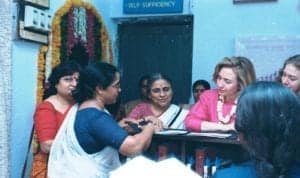This month marks the 20th anniversary of the Fourth World Conference on Women held in Beijing, China in 1995. Many remember this event for Hillary Clinton’s powerful speech where she said, “It is time for us to say here in Beijing, and for the world to hear, that it is no longer acceptable to discuss women’s rights as separate from human rights.” Mrs. Clinton’s remarks were a turning point for women’s rights on an international stage.
The ten-day NGO Forum, which took place alongside the conference in nearby Huairou, was the opportunity for Women’s World Banking to raise the issue of economic empowerment alongside what were traditionally seen as women’s equality issues, such as health and legal rights. In this photo essay, snapshots from Beijing celebrate the visionary men and women who were working towards giving all women access to economic opportunity.
More than 30,000 women from 200 countries came together outside Beijing to discuss how to improve the status of women globally.
The International Coalition on Women and Credit was housed in Women’s World Banking and brought together 30 NGOs to show that poor women are bankable and to make sure that the Beijing platform for action included access to finance for women as a priority. The Coalition formed a “Credit Corner” at the forum to educate people on economic empowerment and its positive impact on low-income communities. There was a real disconnect for people on why a bunch of bankers would be at the event. After days of panels, seminars and small talks people began to understand that access to finance was as critical as access to health services and political systems
With input from the Coalition, the agenda at Beijing reflected an important shift in the strategies used to achieve women’s equality. “We have succeeded in having a major influence on the Beijing Platform for Action. About one third of the [Platform] deals with women’s economic participation and power. It provides concrete action steps to build low income women’s access to finance, information and markets” – Nancy Barry
Pioneering leaders in the field of microcredit, including Ela Bhatt and Muhammad Yunus, took center stage in Beijing to share their experiences lending small amounts of money to poor women. Already in 1995, their work was proving that women were consistently better loan repayers than men and were far likelier than men to invest the resources they generated in their children’s education, nutrition and health care.
CNN sent Judy Woodruff to cover the proceedings. Here she interviews former Women’s World Banking CEO Nancy Barry, Muhammad Yunus and clients.
Hillary Clinton addressed the NGO Forum, “This Conference is about making sure that women, their children, their families, have the opportunities for health care and education, for jobs and political participation, for lives free of violence, for basic legal protections, and yes, for internationally recognized human rights no matter where they are or where they live…
Mrs. Clinton reflected on her time visiting women entrepreneurs in India, “I think of the faces of the beautiful women I met at SEWA, the Self-Employed Women’s Association in India. All of them had walked miles and miles, some of them for twelve and fifteen hours to get to our meeting together, and I listened as they stood up and told me what it had meant that for the first time in their lives, they were having a little money of their own. They could buy their own vegetable carts. They could buy their own thread and materials so that they could make income for themselves and their families.”
The pioneers gathered at Beijing were some of the first to advocate for women’s financial inclusion on the global stage. Twenty years later, the women’s economic empowerment landscape has changed dramatically. We no longer talk about women and credit, but women’s financial inclusion, recognizing that women need many other financial services including savings and insurance. Today, we are taking advantage of technology revolution to serve women on larger, sustainable scale. New players such a large commercial banks and mobile network operators are recognizing the undeniable business case for serving women and joining the “movement.” So, as we look forward to the next 20 years of advocating for women’s economic empowerment, we join with new partners and allies, new financial tools and services, new goals and—most importantly—a renewed international commitment to build on Beijing and achieve full financial inclusion for women.










